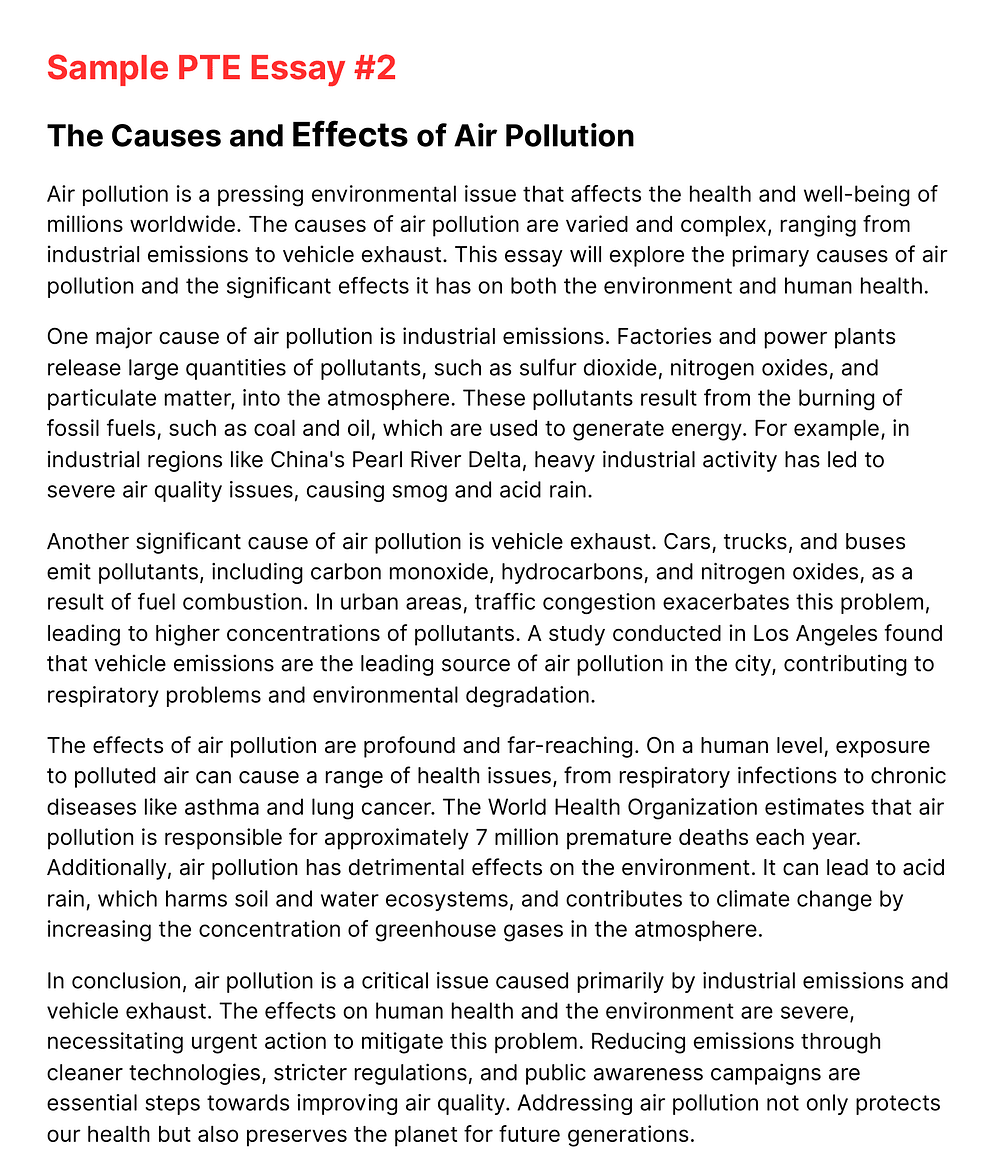Writing an essay can be challenging for the PTE. This applies especially to those who are new to this test. However, there are some proven methods that could help you achieve a high score in the essay part of the test. Use these strategies and tips to develop your writing skills and create an essay that will wow examiners.
This guide contains vital hints and tactics which will enhance your written communication abilities and equip you for success during the examination.
Table of Contents
- PTE writing section
- Proven techniques to score high on the essay
- PTE Essay Samples
- Frequently asked questions
PTE writing section
The PTE writing section tests one’s ability to communicate effectively and accurately in written English. It consists of two parts: an essay and a set of multiple-choice questions.
In the essay task, you must respond to a point of view or opinion by explaining where you stand on it with reasons given why; also examples where necessary should be provided too while still making sure all thoughts are connected together using appropriate sentence structures throughout your response so as not confuse readership any further than is necessary . The length requirement here ranges between 200-300 words long.
Multiple choice items come after essays require selecting correct words/phrases out from list provided as options; sometimes they might need filling up blanks, re-ordering paragraphs or completing sentences among others – all meant for checking one’s grammar knowledge together with vocabulary too within this particular area hence its name being multiple choices .
You will be judged based on how accurate your grammar/spelling is; clarity/effectiveness through writing; development/organization when presenting ideas along with opinions expressed plus relevant content towards given tasks as well as sticking within word limits among other things expected from candidates like adhering strictly according instructions given throughout entire paper thus ensuring best possible scores achieved indeed!
Also Read: Books for PTE Preparation
Proven techniques to score high on the essay
Getting a high score in PTE’s Essay Section is possible if you prepare well enough. Here are some tried-and-tested ways of getting maximum points awarded by examiners:
1. Carefully read through prompt
Make sure to read through the prompt thoroughly before you even begin writing your essay. Go through it several times so that there is no part of it which will escape your attention. This way, you will understand all that is required of you according to the question or topic being dealt with.
Take note of any keywords or key points while reading and think about how they should structure their answers in order to meet what has been asked for based on these words too . You can jot them down therefore enabling easy reference during composition process later on.
2. Come up with ideas brainstorm
Sit down with a pen and paper after going through the question; then start generating possible solutions or answers depending on prompts given. Think deeply about main ideas around particular topic at hand as well related subtopics where necessary before narrowing focus further down into specific areas which might apply personally too besides listing facts figures & evidence needed plus other supporting materials that help prove various points within one’s response towards such questions .
Listing everything helps someone come up with an organized plan because once this stage reached one should be able to know what he/she wants say in essay then draft accordingly.
3. Create an Outline
Generating a skeleton is necessary for any essay as it allows the writer to structure their thoughts and ideas logically. The main points, arguments, and supporting evidence should all be included in this section. An introductory paragraph must also be written as well as a conclusion to summarize the entire work.
To create the skeleton, begin with an introduction which gives an overview of what will be covered in the paper; then follow up with one or two sentences about each main point accompanied by relevant information that supports them such as research findings, quotes from authorities on the subject matter being discussed among others before finishing off with some final remarks at the end.
4. Write a draft
Having finished creating an outline you need to take some time fleshing out your ideas so as to communicate them most effectively in writing. This involves coming up with rough drafts which are later refined until one has crafted something that best delivers their message across. It is advisable not to use too many clichés or jargons while drafting since they may water down your work instead of adding value.
In the process of jotting down points, it is important to maintain coherence throughout by ensuring each sentence flows into another logically without leaving any gaps between different paragraphs or sections hence making sure everything fits together like pieces in a puzzle game. Moreover, all these details should bear relevance to what was outlined earlier on during brainstorming session.
5. Validate your claims
Any statement put forward by an author ought to be supported using evidence obtained from credible sources otherwise such assertions can easily get dismissed by critics for lack of proof. Statistical figures, direct quotations or even instances derived from other works may serve as viable forms of evidence in this regard. This makes people believe what you say because they know where you got it from and how true could possibly be said about anything without backing up any claim whatsoever? Therefore always remember that every argument needs backing up!
While researching ensure that only reputable websites are visited which are closely related to the topic under scrutiny. Additionally, while citing references do so according to required formatting styles as this shows one has taken time researching their paper and can be trusted upon hence failure to do this might lead lower grades being awarded.
6. Use Right Vocabulary
One thing many students forget while writing essays is choosing appropriate words for different audiences which could make them fail exams or have people misunderstand what they wanted to say in the first place. For example if someone is writing a formal essay then slang words or colloquial expressions ought not be used at all but rather select terms that show seriousness and maturity of thought process involved when dealing with academic matters.
Furthermore it also aids understanding along the lines of enhancing clarity; thus readers get better equipped with knowledge about your standpoints as well as arguments put forth within such works.
7. Sentence Variation
Another important aspect of essay writing involves sentence variations because sticking only long complex ones will make it hard for anyone reading through them understand anything from there since ideas seem all over the place instead use short simple ones alongside compound-complex types too where necessary so that people can easily read through without getting lost somewhere down the line even if some parts may appear difficult to comprehend.
8. Edit and Proofread
When you are finished writing your essay, give yourself time to edit it thoroughly. Editing is all about looking at the big picture and making sure everything is clear and concise. It allows you to see how well you have communicated your ideas and identify places where you can do better.
Once you have made all the changes that seem necessary, proofread your paper carefully. This means searching for spelling mistakes, grammar errors, or punctuation problems – anything that might be wrong – and fixing them. Doing this will help ensure that your essay has as few mistakes as possible and is the best it can be.
You might also like
By following the techniques mentioned above you’ll become a PTE writing master in no time; thereby increasing your chances of success greatly. Stay focused throughout the whole process and always give yourself ample time to write an essay because it will pay off eventually.
PTE Essay Samples
Here are more some essay samples PTE essay samples:
Sample PTE Essay 1

Sample PTE Essay 2

Frequently asked questions
What does the PTE writing section test?
The Pearson Test of English (PTE) writing section tests your ability to communicate clearly and accurately in written English. It consists of an essay and a set of multiple-choice questions.
How to create an outline for the essay?
When creating an outline, start with the introduction to provide a brief overview of the essay. Next, develop an outline for each of your main points accompanied by evidence to support it. Finally, end the outline with the conclusion to summarize the main points and provide a final thought on the topic.
Why is it important to edit and proofread your essay before submitting it?
Editing helps to evaluate how effectively you have conveyed your ideas and identify any areas where improvement may be needed, while proofreading helps to ensure that the essay is as error-free as possible and that it is of the highest quality.
